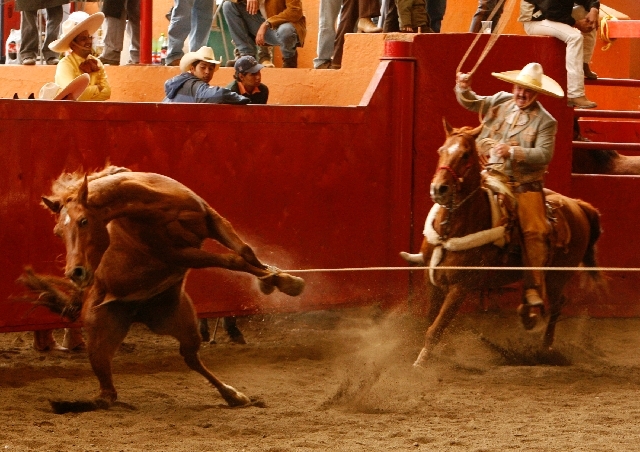Horse roping controversy in Clark County isn’t over yet

CARSON CITY — The horse roping controversy in Clark County isn’t over yet.
The County Commission is expected to revisit its ordinance banning horse tripping, also called horse roping, after members of the Legislative Hispanic Caucus expressed disappointment at a 6-1 vote on Tuesday keeping the prohibition intact.
The issue is politically and emotionally charged, with animal rights advocates staunchly opposed to any change while Hispanic lawmakers argue the current ban is unnecessary.
State Senate Majority Leader Mo Denis, D-Las Vegas, a member of the caucus, said he supports a change to the ordinance to follow the language of Senate Bill 72 of the 2013 session that allows roping but releasing the legs of a horse so that the animal is not intentionally tripped.
The Mexican Federation of Charreria USA, which wants to hold events in Clark County, is concerned about the welfare of the horses, he said.
“Nobody wants to trip horses,” Denis said. “We’re concerned about the safety of the animals but at the same time we want to offer cultural events that are important to the community.”
An event has been scheduled in Clark County with the expectation that the ordinance would be changed. The World Series of Charreria Las Vegas 2013 is scheduled for Sept. 25-29 at South Point.
The series has nine events, three that would have featured horse roping that cannot happen now. The rodeo could go on with the six other events that don’t involve horse roping.
ANIMAL RIGHTS ADVOCATE OBJECTS
Denis said the members of the commission will be better informed on the issue when they are expected to reconsider their ordinance later this month.
But an animal rights advocate who attended the commission meeting to oppose ending the ban said groups will be out in force to keep the ordinance in place.
Gina Greisen, president of Nevada Voters for Animals, said a coalition of groups is organizing to oppose any change to the county ordinance.
“We’re working with other community advocates who are not typically involved in animal issues but who are furious about this,” she said. “It’s going to be an all-or-nothing offensive. We’re seeking help from national groups to support our efforts to block this from happening.”
Greisen criticized the legislative backroom negotiations that resulted in SB72 being passed, saying the bill was an attack on Clark County’s ban on horse tripping which has proved to be accurate.
The intent was to get the bill passed with an agreement from County Commissioner Chris Giunchigliani to weaken the county law, she said.
“Even though we know it happens like this; that we’re all jaded; it still ticks me off,” Greisen said.
COMMISSIONER SEEKS RECONSIDERATION
Giunchigliani, who introduced the proposal to change the county’s ordinance but ultimately voted against any change, confirmed she has asked for reconsideration.
She said she believes the catch-and-release wording in the new state law should be incorporated into the county’s ordinance to ensure the safety of the animals while allowing the Charreria events to be held in the county.
But at the hearing earlier this week there was no organized contingent of people testifying on why the ordinance should be changed to allow catch and release of the legs, she said.
Nearly all of the testimony was opposition to the change, and so the vote turned out the way it did, Giunchigliani said.
Supporters of Charreria and the proposed change should come to the next hearing to educate commissioners on why it should go forward, she said.
In the meantime Giunchigliani said she is looking at a temporary permit for the September event so the organizers can move forward with their advertising and planning.
The vote on reconsideration is set for Aug. 20, but the change to the ordinance could not be approved until Sept. 3, just a few weeks before the event is scheduled to occur.
CHARRERIA BACKERS PLAN TO SPEAK UP
Alejandro Galindo Jimenez, Nevada president of the Mexican Federation of Charreria, said supporters of the ordinance change did not realize there would be a full hearing on the issue at the Tuesday meeting and were shocked at the vote.
Supporters will be better prepared to make their case for the change when the issue comes up before the commission the next time, he said.
Galindo Jimenez reiterated that there is no intentional horse tripping at their events.
“We are dedicated to animal welfare,” he said.
Holding a Charreria in Las Vegas will give the public a chance to see the event and to learn there is no horse tripping, Galindo Jimenez said.
Commissioner Tom Collins, the lone vote of support for changing the county’s ordinance, said the law should be changed because it is discriminatory against Hispanic culture and the Hispanic community.
The reconsideration is coming about because Hispanic lawmakers were upset with the 6-1 vote, he said. They thought the change would be approved, Collins said.
“They were definitely betrayed,” he said.
Denis said that during the legislative session, lawmakers were told that if the law was passed it would allow Clark County to change its ordinance to allow for permits for such events.
The big Charreria event scheduled for September was part of the reason for the change, he said.
If the commission votes to change its ordinance to allow the events, it will show the growing clout of Hispanic lawmakers in Nevada.
The Legislature in 2003 had only one Hispanic lawmaker. The 2013 session had seven Hispanic members, two in the Senate and five in the Assembly.
Contact Capital Bureau reporter Sean Whaley at swhaley@reviewjournal.com or 775-687-3900.












